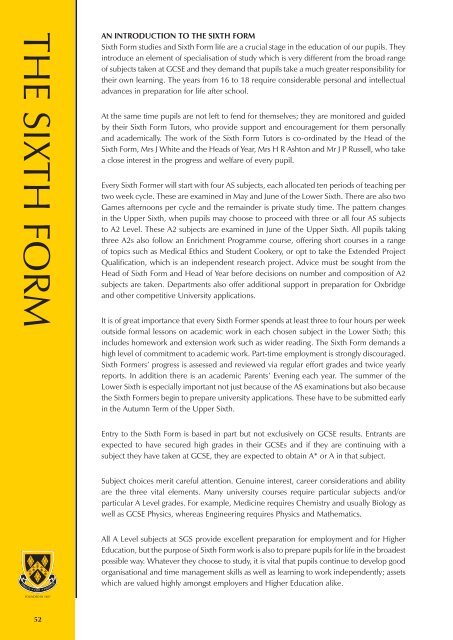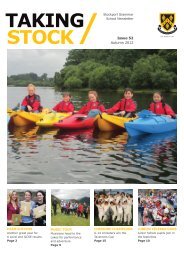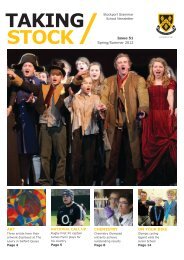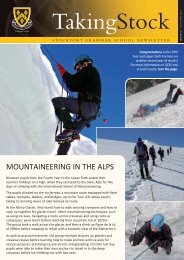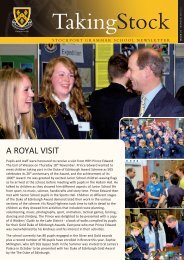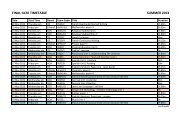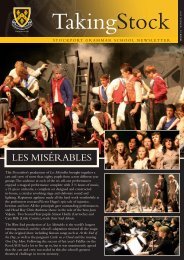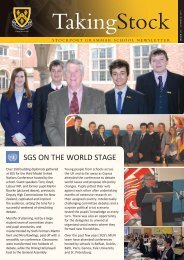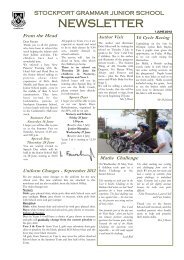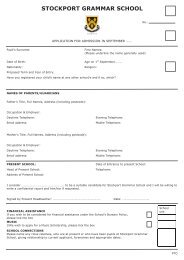Information Book Just for Starters - Stockport Grammar School
Information Book Just for Starters - Stockport Grammar School
Information Book Just for Starters - Stockport Grammar School
Create successful ePaper yourself
Turn your PDF publications into a flip-book with our unique Google optimized e-Paper software.
THE SIXTH FORM<br />
AN INTRODUCTION TO THE SIXTH FORM<br />
Sixth Form studies and Sixth Form life are a crucial stage in the education of our pupils. They<br />
introduce an element of specialisation of study which is very different from the broad range<br />
of subjects taken at GCSE and they demand that pupils take a much greater responsibility <strong>for</strong><br />
their own learning. The years from 16 to 18 require considerable personal and intellectual<br />
advances in preparation <strong>for</strong> life after school.<br />
At the same time pupils are not left to fend <strong>for</strong> themselves; they are monitored and guided<br />
by their Sixth Form Tutors, who provide support and encouragement <strong>for</strong> them personally<br />
and academically. The work of the Sixth Form Tutors is co-ordinated by the Head of the<br />
Sixth Form, Mrs J White and the Heads of Year, Mrs H R Ashton and Mr J P Russell, who take<br />
a close interest in the progress and welfare of every pupil.<br />
Every Sixth Former will start with four AS subjects, each allocated ten periods of teaching per<br />
two week cycle. These are examined in May and June of the Lower Sixth. There are also two<br />
Games afternoons per cycle and the remainder is private study time. The pattern changes<br />
in the Upper Sixth, when pupils may choose to proceed with three or all four AS subjects<br />
to A2 Level. These A2 subjects are examined in June of the Upper Sixth. All pupils taking<br />
three A2s also follow an Enrichment Programme course, offering short courses in a range<br />
of topics such as Medical Ethics and Student Cookery, or opt to take the Extended Project<br />
Qualification, which is an independent research project. Advice must be sought from the<br />
Head of Sixth Form and Head of Year be<strong>for</strong>e decisions on number and composition of A2<br />
subjects are taken. Departments also offer additional support in preparation <strong>for</strong> Oxbridge<br />
and other competitive University applications.<br />
It is of great importance that every Sixth Former spends at least three to four hours per week<br />
outside <strong>for</strong>mal lessons on academic work in each chosen subject in the Lower Sixth; this<br />
includes homework and extension work such as wider reading. The Sixth Form demands a<br />
high level of commitment to academic work. Part-time employment is strongly discouraged.<br />
Sixth Formers’ progress is assessed and reviewed via regular ef<strong>for</strong>t grades and twice yearly<br />
reports. In addition there is an academic Parents’ Evening each year. The summer of the<br />
Lower Sixth is especially important not just because of the AS examinations but also because<br />
the Sixth Formers begin to prepare university applications. These have to be submitted early<br />
in the Autumn Term of the Upper Sixth.<br />
Entry to the Sixth Form is based in part but not exclusively on GCSE results. Entrants are<br />
expected to have secured high grades in their GCSEs and if they are continuing with a<br />
subject they have taken at GCSE, they are expected to obtain A* or A in that subject.<br />
Subject choices merit careful attention. Genuine interest, career considerations and ability<br />
are the three vital elements. Many university courses require particular subjects and/or<br />
particular A Level grades. For example, Medicine requires Chemistry and usually Biology as<br />
well as GCSE Physics, whereas Engineering requires Physics and Mathematics.<br />
All A Level subjects at SGS provide excellent preparation <strong>for</strong> employment and <strong>for</strong> Higher<br />
Education, but the purpose of Sixth Form work is also to prepare pupils <strong>for</strong> life in the broadest<br />
possible way. Whatever they choose to study, it is vital that pupils continue to develop good<br />
organisational and time management skills as well as learning to work independently; assets<br />
which are valued highly amongst employers and Higher Education alike.<br />
52


